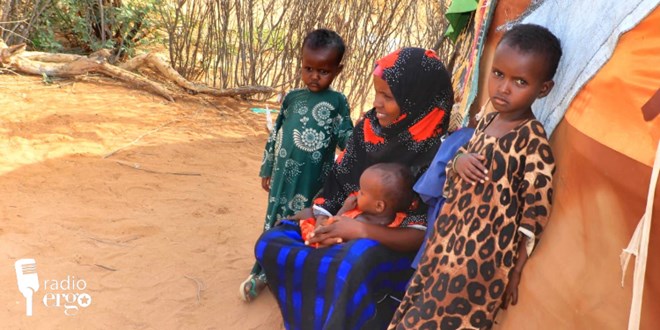
Saturday February 18, 2023

Ruqiyo Roble Kasim has been living in Dadaab refugee camp in northern Kenya for a month, struggling to care for her four grandchildren, without any aid or support.
“New families like us don’t cook during the day. We only cook at night. We are living in a very desperate situation. There is nothing we can do,” said Ruqiyo, whose daughter, the young children’s mother, died a year and a half ago.
advertisements
They cook mainly maize that they are lucky to get from neighbours in the camp, who have some access to aid or earnings. She has been looking for laundry jobs to earn a few shillings but has not yet found work.They sleep in a makeshift hut providing minimal shelter from sun and wind.
“Our shelter is not properly covered and we haven’t got any plastic sheeting. I don’t have blankets for the children. We have to queue for water but at least we get some,” she complained.
Ruqiyo told Radio Ergo’s local reporter that she left their home in Afmadow in Middle Juba after the last animal in her herd of livestock died in the drought.
“We had 10 cows and 14 goats. The cows died and then we sold some of goats to feed the children. When we lost everything, we decided to move. I decided to move them to the refugee camp,” she said.
She and her children travelled for five days in a lorry that charged her $240 to reach Dadaab. Her husband died of illness in December and his relatives gave her the money to leave the parched rural area, thinking they would be better off as refugees.
Return to Dadaab after loss of livelihoods in southern Somalia
Another mother, Nurto Abdi Nur, 28, returned to Dadaab on 25 January with her seven children hoping to register again as a refugee and receive aid.
She was repatriated from the refugee camp in 2016 after living there for three years as a registered refugee.
She said she decided to leave her village of Hagar in Lower Juba for a second time after losing all her 40 cows and 100 goats between March and October 2022. She also gave up on her farm due to successive failed rainy seasons leading to crop failure.
They used their donkey as a pack animal and travelled the 212 kilometres to Dadaab on foot, taking two months and 11 days to reach the camp.
“The road trip was hard. We took two jerry cans of water. When the donkey got tired we had to off-load one of them. We were tired and faced thirst and hunger,” Nurto said.
They stopped frequently in various villages along their way to rest, asking for food and water from the local people, and resuming their journey again.
Without any refugee registration going on, she has no access to food or shelter or other basic for her children.
“We get some food handouts from the local families. We only get maize and that is not food that can be eaten by one or two-year-old children.
We are in a difficult situation and we pray that we get some assistance,” she said.
She felt dejected seeing families who had joined the camp some months before her still not being registered or getting any aid.
Most families joining the refugee camps recently have been displaced from Bay, Bakool, and Gedo regions.
The leader of Dagahaley camp in Dadaab, Abdullahi Ali Adan, said there is a food shortage in the camp and they have been trying to collect food from others to help the new families. He said 358 families have joined the camp since January.
He added that since June last year, 80,439 people fleeing drought and conflict in Somalia have joined the camp.